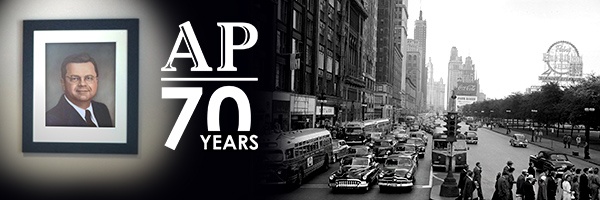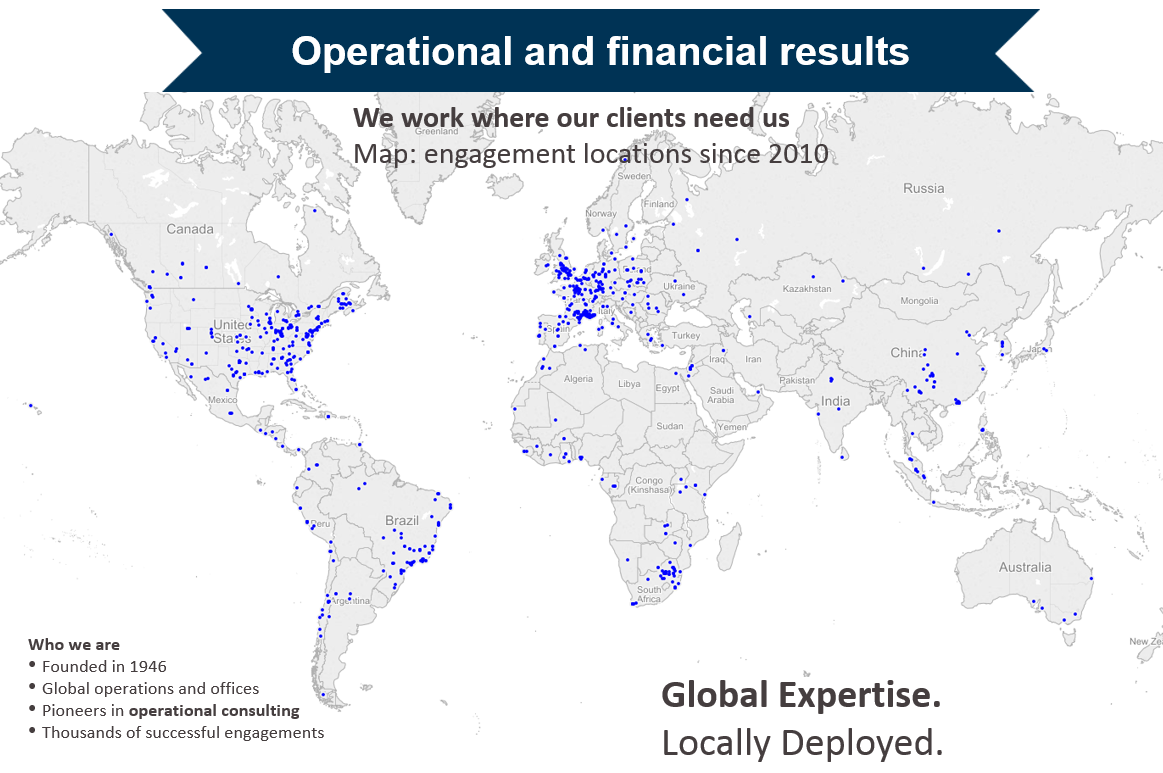
Today signifies a major milestone in Alexander Proudfoot's storied history -- it marks the 70-year anniversary of the company's existence.

Image: Our founder, Alexander Proudfoot
Founded on February 25, 1946, Alexander "Alec" Proudfoot envisioned a better way to help companies achieve their operational goals. His top-down philosophy of developing human traits that contribute to a company's success has stood the test of time and continues to be the driving force behind our business.
The journey begins
Alec’s story begins at the University of Chicago where he received a doctorate degree in economics. However, it wasn’t until he started working in the catalog division of Montgomery Wards that he became interested in the art of human engineering. It all started when he noticed that some individuals were filling orders much faster than their coworkers. He became fascinated with their variances in productivity and soon came to the realization that if everyone had the same efficient mindset, the results would be far more predictable.

Image: Alec's football-playing days at the University of Chicago in 1922
In 1946, Alec decided to go into business for himself and create a new brand of consulting services. He had two main criteria for running his business. First, he would sell a unique, proprietary product with a universal application that would produce dramatic, tangible results with benefits far exceeding the actual cost. And second, he would only accept assignments where the client partnered with him and his company to install the program and implement the required changes.
Years ahead of his time, Alec recognized early in his consulting career that there was not enough interaction with the client -- most consulting firms in those days would simply deliver reports or manuals without actually implementing the changes. By guiding his clients’ thought process, he felt that he could transform each business into something greater than they could ever imagine.
In pursuit of a product offering, Alec was looking for something that would have a universal application. He searched for a need – something that would be meaningful and important to any company.
The Proudfoot Way
 After several years of analyzing hundreds of companies in many different industries, Alec discovered they all shared the same, major deficiency: low utilization of resources (e.g. plant capacity, equipment, manpower and materials). It was the main reason for excess costs, poor customer service, bad quality and lost sales. His findings pointed to an endless array of recurring and lingering problems that many companies could not identify or correct on their own as the reason for wasted time. In many instances, the root cause of the problem was associated with a lack of discipline; poor planning; a failure to execute; ineffective management and supervision; lack of skills; ineffective training; and negative attitudes. It was during this time Alec authored the “Proudfoot Concept of Lost Time” which refers to expenditures incurred when doing things that do not support quality, cost and delivery requirements.
After several years of analyzing hundreds of companies in many different industries, Alec discovered they all shared the same, major deficiency: low utilization of resources (e.g. plant capacity, equipment, manpower and materials). It was the main reason for excess costs, poor customer service, bad quality and lost sales. His findings pointed to an endless array of recurring and lingering problems that many companies could not identify or correct on their own as the reason for wasted time. In many instances, the root cause of the problem was associated with a lack of discipline; poor planning; a failure to execute; ineffective management and supervision; lack of skills; ineffective training; and negative attitudes. It was during this time Alec authored the “Proudfoot Concept of Lost Time” which refers to expenditures incurred when doing things that do not support quality, cost and delivery requirements.
Alec knew there could be no single solution to problems that tend to fluctuate and vary with each client. On the other hand, if the problems were so universal he felt he could design a series of techniques and methods that were flexible enough to adapt to the unique needs of each client. He proceeded to create what became known as the Proudfoot System, a unique method to detect the causes for lost time and waste in an organization. It combined a series of principles, methods, procedures, technologies and philosophies to correct problems and prevent them from reoccurring.
In pursuit of a higher truth
Over the years, Alec developed quite a reputation for being an expert businessman. Inspired by the works of mechanical genius William Emery Nickerson, inventor of the world’s first disposable razor blade, he adopted Nickerson’s stance that wisdom superseded knowledge. In his excerpt Knowledge plus Wisdom from the book Foundations for Human Engineering, Nickerson wrote, “Wisdom is the ability to judge soundly and sagaciously with facts, especially as they relate to life and conduct.” This quest for a “higher truth” explains why Alec had such an incredible knack for quickly analyzing an unfamiliar company’s operations and then offering the exact solutions they would need to improve. It also allowed him to distinguish between symptoms and the root causes of problems which set him apart from the competitors of his time.
An astute teacher, philosopher
Alec was massive in size and stature, and had a speaking style that was compared to Teddy Roosevelt's -- his continuous surge of physical energy was both infectious and inspirational. In his teachings, he would mold his consultants into human psychologists that were capable of aligning the hearts and minds of the organization.
Alec’s teachings embraced the entire spectrum of human development. He was a student of the Socratic Method and used this approach to train his people how to navigate client discussions toward a unilateral agreement. This involved asking the right questions so clients could draw their own conclusions about potential changes. Citing Stoic philosophers, Alec taught his employees how to face hardships, criticism and frustrations without losing faith in themselves or their mission. One of his favorite quotes was by Aristotle: “The teacher always learns more than the pupil.”
A man of action
Although Alec was an intellectual, he considered himself a man of action and he employed people with similar traits. Interestingly enough, he avoided intellectuals because they lacked interest in action and its rewards -- a requirement for worldly success.
Alec was a firm believer that action did not have as much to do with intellect as it did character. He often mentioned those who only talked about what could be accomplished being outshined by those who strived to achieve something. Proudfoot was not interested in how intelligent a person was; rather, it was the ability to use intelligence wisely and to conduct oneself successfully that appealed to him. He attributed this to particular traits that defined an individual’s character and personality. This is one of the reasons why Alec spent so much of his time helping his people improve these qualities.
Alec's legacy
Realizing that all his dreams would die with him unless he passed them on, Alec spent the last years of his life developing a management team that was deeply committed to his goals. In the few years prior to Alec's death, this group led the company through the developments that advanced the Proudfoot methodology to increasingly larger, and more diversified and sophisticated applications. Since his passing in 1968, Alec's successors have increased the size and scope of the business far beyond his original expectations. Today, one of Alexander Proudfoot's greatest assets is its current management group, most of whom have been with the company for many years.
Known as the pioneer of process improvement, Alexander Proudfoot has completed more than 17,000 client engagements and has offices in 12 different countries. In the last five years alone, Proudfoot consultants have completed projects in 92 countries all over the world.

| What else was happening in 1946? |
|
World events
Other news
US Statistics
|
